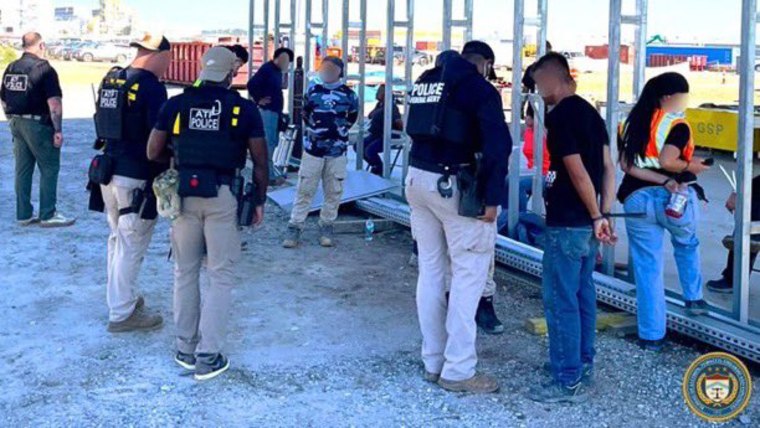South Korean President Lee Jae-myung ordered “all-out efforts” to respond to the arrests of hundreds of its citizens in an immigration raid on a Hyundai facility in Georgia, as the key American ally and trading partner reeled from the news.
Federal and immigration agents arrested 475 people — mostly South Korean nationals — while executing a judicial search warrant as part of a criminal investigation into alleged unlawful employment at the facility.
At an emergency government meeting Saturday, South Korea’s Foreign Minister Cho Hyun said he was “deeply concerned” and felt “heavy responsibilities for the arrests of our citizens.”
The foreign ministry told NBC News that the government had set up a response team and that Cho was prepared to travel to Washington to meet officials if needed, while Cho reiterated earlier remarks made by Lee that the rights of South Koreans “must be not unjustly infringed.”
The raid, part of the Trump administration’s escalating crackdown on immigrants, was the largest single-site enforcement operation in the history of the Department of Homeland Security.
A sea of agents from HSI, Immigration and Customs Enforcement and other federal agencies showed up Thursday to the site in the town of Ellabell where Hyundai and LG Energy Solution are jointly building a battery plant next to their manufacturing facility for electric vehicles.
LG Energy Solution said Saturday that 47 of its employees were detained, 46 of them Korean. Another 250 personnel from “equipment partner companies,” most of them Korean, were also being held, it added.

“We are making every possible effort on all fronts for the prompt release of our personnel and partner company staff who have been detained,” the company said, adding that it had suspended employees’ business travel to the U.S. and urged those already there to “return home or remain at their accommodations.”
Hyundai said none of those detained were directly employed by the firm.
Charles Kuck, an Atlanta-based immigration attorney representing two of the detained South Korean nationals, told NBC News on Friday that his clients were in the U.S. on the Visa Waiver Program, which permits tourism or business stays of up to 90 days.
“I’m convinced neither of these guys are violating their status in any way,” Kuck said, adding that both of his clients are process engineers who came over for meetings related to the construction of the new plant.
No criminal charges in connection with the investigation had been filed as of Friday.
The incident threatens to strain ties with South Korea, the world’s 10th-largest economy.
The raid came just 11 days after a summit between Trump and Lee at the White House, where South Korean firms pledged $150 billion in U.S. investments. In July, Seoul pledged another $350 billion in U.S. projects in an effort to reduce Trump’s threatened tariffs, which he later set at 15%.
Jang Dong-hyuk, leader of the opposition People Power Party, warned in a Facebook post Saturday that the raid “could lead to wider repercussions for South Korean businesses and communities throughout the U.S.”
“This incident goes beyond a simple crackdown on undocumented immigrants and is a very serious matter,” he said, urging the government to safeguard “overseas Koreans and the rights of our businesspeople.”
“At a time when numerous South Korean companies are building factories and expanding investments across the U.S., repeated mass arrests of workers will inevitably escalate into a national-level risk,” he added.
A party spokesperson called the raid a “diplomatic disaster” and asked whether South Korea had been “slapped in the face after making huge investments.”
South Korea’s largest daily, Chosun Ilbo, struck a similar tone, framing the arrests as a betrayal and a harsh blow to South Korea.
“After Investing in ‘Trump MAGA,’ What Came Back Was the Arrest of 300 Koreans,” the headline read.
White House spokesperson Abigail Jackson told NBC News on Friday that President Donald Trump remains committed “to make the United States the best place in the world to do business, while also enforcing federal immigration laws.”